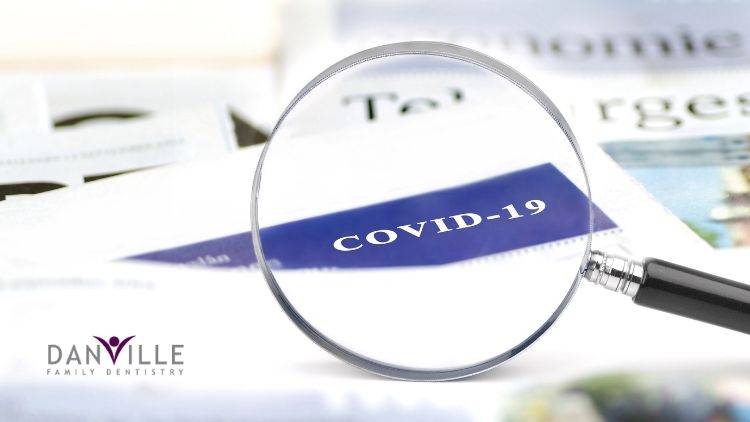COVID-19 was originally thought to mainly impact the lungs and respiratory system. However, throughout the length of this pandemic we are finding new side effects and consequences.
Everyone reacts to the coronavirus in different ways. Some spike sky-high ever. Others lose taste and/or smell. Some have difficulty in breathing and still others have weeks of fatigue. There are even reports of blood-clots, skin rashes, hair loss and COVID toes.
Some people report continued issues that persist long after the original bout with the virus. Some of those include muscle aches, taste and smell loss, fatigue, brain fog, and nerve pain. COVID seems to be impacting more and more body systems than we originally saw.
COVID-19 and Oral Health
Anecdotal research is reporting that the infection may also impact oral health. Dentists provide examples of patients having sensitive teeth, weakened gums, discoloration of teeth, or even tooth breakage or loss. It’s not surprising that patients who already had dental challenges may seem them aggravated by encounters with the coronavirus. According to a Centers for Disease Control and Prevention 2012 report, the incidence of periodontal disease is high. More than 47% of adults 30 years or older have some form of periodontal disease. This includes infections and inflammation of the gums and bone that surround teeth. Subsequently, this makes these adults more prone to these COVID side effects.
Some common oral manifestations of COVID -19 can include:
- Bleeding and/or Inflamed Gums
- Dry Mouth
- Mouth Sores or Ulcers
- Cracked or Broken Teeth
- Loss of Teeth
- Gray or Discolored Teeth
- Loss of Taste and/or Smell
Survivor Corps is a group founded by Diana Berrent dedicated to COVID -19 patients. The group has grown to more than 116,000 members. Those in the Survivor Corps community share stories of their symptoms pre, during, and post COVID diagnosis. On one hand, members share symptoms in real time as they are first appearing. Sometimes the group catches patterns before media or research does.
What is the Oral Health Problem?
It is too soon to confirm a clear well-established scientific link between COVID-19 and oral health. But many health experts suspect COVID may directly infect blood vessels and disrupt blood flow to gums, teeth, and tongue. William Li is a vascular biologist and the medical director of the Angiogenesis Foundation. He says,
“Your jaw is very richly fed with blood vessels. We’ve got lots of teeth, sensitive gums, a tongue and taste buds that all need to be nurtured. The gums are extremely vascularized, and inside the tooth is the dental pulp, or the living, breathing part of the tooth, that is packed with blood vessels along with nerves.”
Unfortunately, the damage that COVID appears to do to the vascular system does not subside as the person recovers. It can wreak havoc and persist well after the disease is gone. In addition, it can cause dental flare ups over time.
Patients reporting tooth loss in connection to a COVID diagnosis see teeth fall out with no blood or pain. This fact would seem to corroborate the theory that the disease is impacting the blood vessels in the mouth. The teeth are not getting blood and this is causing them to fall out. Therefore, there is no blood when the tooth does come out.
The Mouth is a Haven for COVID-19
In fact, our mouth can be a place where the virus can harbor. When COVID infects the body it latches itself onto the part of our cell called the ACE2 receptors. These receptors are prevalent in certain areas of the body including the lungs. This is why the disease has such a high rate of respiratory symptoms and damage. As it turns out, the mouth is also full of a high number of these ACE2 receptors. “The fact that the mouth has ACE2 receptors means there is a theoretical, biological pathway by which the virus could have a direct effect on the mouth,” advises Eric Cioe-Pena, director of global health at Northwell Health in New York. The oral cavity could be a great environment for the coronavirus to camp out and replicate itself.
More Research is Needed
It’s crucial to recognize that more research needs to be done. The results will provide the data from which experts make any solid conclusions. Especially about how, why and if COVID-19 might damage people’s teeth. “COVID is like a thousand-piece puzzle,” Li said. “You can start seeing some of the big pieces of it put together, but there are so many pieces in different corners, and this dental piece is sort of the new area of the puzzle that people are starting to work on.” “We don’t have enough data yet to know whether this is purely a temporal association or causation. The short answer is: It’s too early to tell,” Cioe-Pena said. Doctors are just starting to put together the clues to uncover the full magnitude of COVID-19. This is still a new disease, and we have yet to understand all its effects.
At Danville Family Dentistry whether related to COVID-19 or not, we treat symptoms and get your mouth healthy again! Contact us today!
Are you on Facebook? We are, too! Let’s be friends!
Disclaimer: The information included in this article is for educational purposes only. It should not be used as a substitute for professional medical advice, diagnosis or treatment.


 (317) 745-4400
(317) 745-4400 info@danvilledentalcare.com
info@danvilledentalcare.com